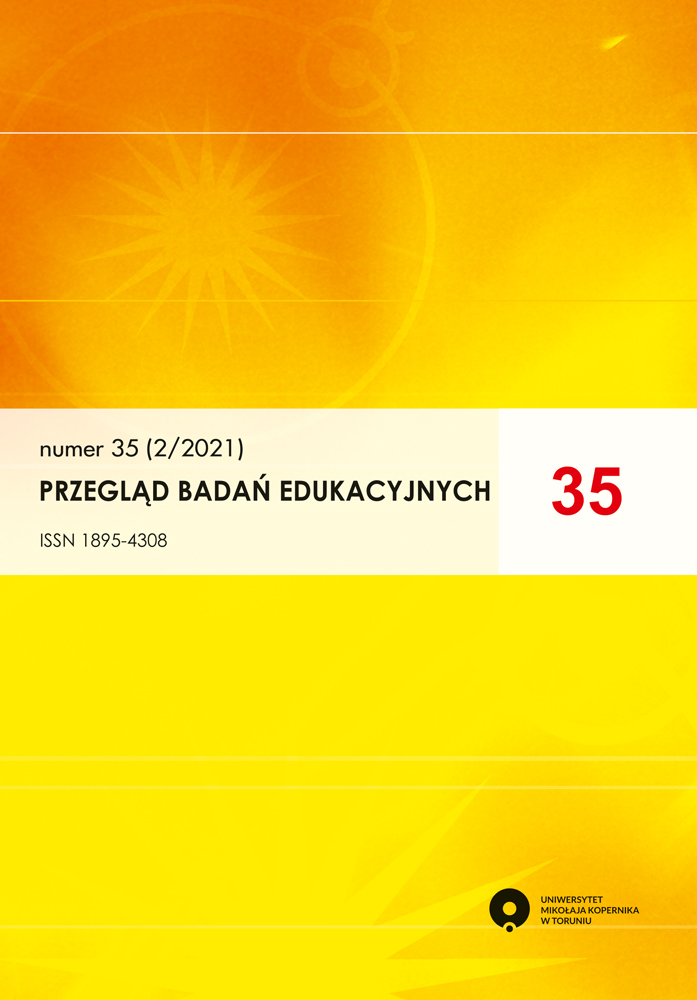Changing the Health Behaviour of Students During the COVID-19 Pandemic in Poland
DOI:
https://doi.org/10.12775/PBE.2021.033Keywords
pandemic, health behaviours, health education, Health Belief Model, iGenAbstract
The COVID-19 pandemic has caused unprecedented changes in educational, professional, and leisure activities around the world. Protecting health against the virus has become the most important task in the social and individual dimension. The aim of the study was to diagnose changes in the behaviour and health beliefs of students. The WHO definition of health and the Health Belief Model (HBM) were adopted as the theoretical basis for defining variables. The study was of diagnostic and verification nature, and a quantitative strategy was used in it. The general population comprised students of Nicolaus Copernicus University in Torun. The study was conducted electronically in 2020, during the first lockdown in Poland. The Likert scale was used as a tool to assess the degree of change. The respondents declared the greatest changes in terms of caring about physical and relational health. The declared behavioural changes concerned the most conservative, trained forms of pro-health activity. Despite the declared beliefs about the importance of maintaining health and the personal risk of viral infection, the respondents declared undertaking more advanced pro-health activities only to a small extent.
References
Abraham, C., & Sheeran, P. (2015). The Health Belief Model. In: M. Conner, & P. Norman (Eds.), Predicting and Changing Health Behavior (pp. 30–69). Retrieved 20 October 2021 from: https://www.researchgate.net/publication/290193215_The_Health_Belief_Model#fullTextFileContent.
Jaspers, K. (1999). Wiara filozoficzna wobec objawienia [Philosophical Faith and Revelation]. Transl. by G. Sowinski. Kraków: Znak.
Kosiba, G., Gacek, M., & Wojtowicz, A. (2019). Readiness to Change and Pro-Health Behaviours Among Students of Physical Education and Other Teaching Specialisations. Central European Journal of Sport Sciences and Medicine, 4(28), 53–65, doi: 10.18276/cej.2019.4-05.
Palacz, J. (2014). Zachowania zdrowotne studentów w świetle wybranych uwarunkowań [Health Behaviours of Students in the Light of Selected Conditioning]. Medycyna Ogólna i Nauki o Zdrowiu, 20(49), 301–306, doi: 10.5604/20834543.1124662.
Potępa, M. (2003). Spór o podmiot w filozofii współczesnej. Husserl – Heidegger – Gadamer – Jaspers [The Dispute Over the Subject in Contemporary Philosophy. Husserl – Heidegger – Gadamer – Jaspers]. Warszawa: Oficyna Wydawnicza Warsgraf.
Prochaska, J.O., & DiClemente, C.C. (1982). Transtheoretical Therapy: Toward a More Integrative Model of Change. Psychotherapy: Theory, Research and Practice, 20, 161–173. doi: 10.1037/h0088437.
Sęk, H. (2000). Zdrowie behawioralne [Behavioural Health]. In: J. Strelau (Ed.), Psychologia. Podręcznik akademicki, t. 3 [Psychology. An Academic Coursebook, Vol. 3] (pp. 443–464). Gdańsk: Gdańskie Wydawnictwo Psychologiczne.
Twenge, J.M. (2019). iGen: dlaczego dzieciaki dorastające w sieci są mniej zbuntowane, bardziej tolerancyjne, mniej szczęśliwe – i zupełnie nieprzygotowane do dorosłości* i co to oznacza dla nas wszystkich [iGen: Why Today’s Super‐Connected Kids Are Growing Up Less Rebellious, More Tolerant, Less Happy and Completely Unprepared for Adulthood* and What Does it Mean for All of Us]. Transl. by O. Dziedzic. Sopot: Smak Słowa.
Žižek, S. (2020), Pandemia! COVID-19 trzęsie światem [Pandemic! COVID-19 Shakes the World]. Transl. by J. Maksymowicz-Hamann. Warszawa: Wydawnictwo Relacja.
Downloads
Published
How to Cite
Issue
Section
License
Copyright (c) 2021 Przegląd Badań Edukacyjnych (Educational Studies Review)

This work is licensed under a Creative Commons Attribution-NoDerivatives 4.0 International License.
Stats
Number of views and downloads: 974
Number of citations: 0



